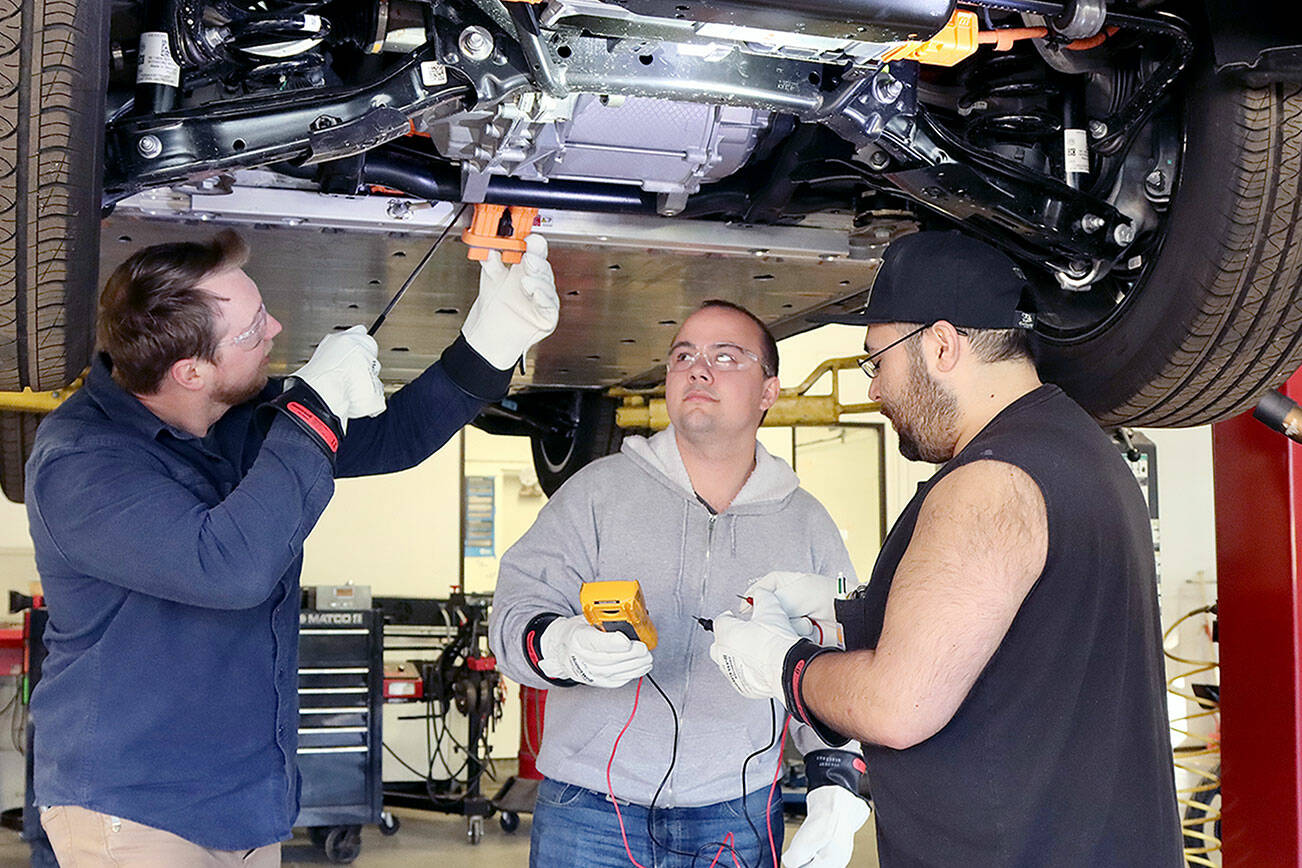PORT ANGELES — Peninsula College is relaunching its automotive technology program with a new instructor, a new curriculum and a renewed focus on workforce readiness that includes a course in electric vehicle diagnostics and repair.
The first cohort in the six-month Automotive Service Technician certification course began in January and will be ready to hit the job market in June.
The program has been on hiatus since about 2019 due to declining enrollment, said Brian Kneidl, associate dean for workforce programs. At one point there were only two students.
The college wanted to rethink and reorganize the program so that it could meet the demands of local employers and respond to students’ preferences for how they want to study.
Kneidl spoke with an advisory committee made up of local dealerships, repair shops and other automotive businesses to learn what they wanted and needed. Several common themes emerged.
“They weren’t looking for someone with a two-year degree, so we decided we’d start with a short certificate program,” Kneidl said. “One of the biggest skills they were looking for was being able to quickly diagnose the vehicle and have a good understanding of the basic electronics.”
Funding from the Peninsula College Foundation ($309,111) and $150,000 from the Washington State Council for Community and Technical Colleges Workforce Development Fund launched the program and allowed the college to purchase an electric Volkswagen IQ.4 and a hybrid Toyota Prius . (There are no plans to purchase a vehicle from Tesla, which requires vehicle owners to use in-house technicians and certified workshops.)
The college also purchased equipment needed to train students on electric vehicles, such as insulated versions of tools such as ratchets, pliers, screwdrivers and wrenches, high voltage meters and personal equipment such as insulated rubber gloves.
With an estimated 1.6 million electric vehicles sold in the United States in 2023 — a 60 percent increase from 1 million sold in 2022, according to the International Energy Agency — the college wanted its students to be equipped with skills that would prepare them for the workforce strength.
With the demand for electric vehicles still continuing, the college also wanted to create a program to help as many employers as possible.
“Some were very much like, ‘Yeah, this is the future,’ and others were like, ‘Wow, we still have a lot of late-model cars,'” Kneidl said. “It was important to balance both.”
The college originally planned to begin the revised automotive technology program in the fall of 2023, but difficulties in finding an instructor with the right knowledge and experience pushed the start to the winter quarter of 2024.
“I got lucky and found someone and he just had all the skills I needed,” Kneidl said of Josh Taylor, who started his new job just a few weeks before classes started.
It was a return to campus for Taylor, who had attended Peninsula College after graduating from Port Townsend High School. He found his niche in the automotive industry, working in the electronics field for about 15 years.
“I then worked for three different electric vehicle startups in the Seattle area, doing everything from retrofitting electric vehicles to upgrading batteries to increase the range of electric vehicles,” Taylor said.
Most recently, he was lead engineer and project manager for Peace Vans in Seattle, which converted Volkswagens with internal combustion engines to electric vehicles.
Although he’s never been a college professor, Taylor said the role is appealing.
“Throughout the positions I’ve held over the past few years, my favorite part of the job has always been teaching, so I wanted to give it a try,” Taylor said.
For students, an automotive technology certification program requires a smaller investment of time and money than a two-year degree to prepare them for a position as an entry-level technician.
Brian Selk of Port Angeles is one of eight students enrolled in the program. He said he took a few auto classes when it was an associate degree program, but returned in part because it would only take two quarters to get certified.
“I want to be able to fix my own vehicle,” Selk said. “I’m not that into electric vehicles, but it’s something you should know.”
This summer, Kneidl and Taylor will contact the program’s advisory committee and reevaluate the curriculum. Among the ideas they are considering is the development of specialized automotive certifications that could prepare students for Automotive Service Excellence (ASE) testing and credentials.
“There are a lot of opportunities because you can teach so much,” Kneidl said. “We hope to get a diesel vehicle soon and maybe offer a diesel mechanic or heavy vehicle repair certificate.”
Taylor said not only has auto repair changed since he was a student, but the role of the people who work on vehicles has also changed. It’s important for students to understand that mindset, he said.
“I tell them, ‘You’re not auto mechanics, you’re auto technicians,'” he said.
________
Reporter Paula Hunt can be reached by email at [email protected].

